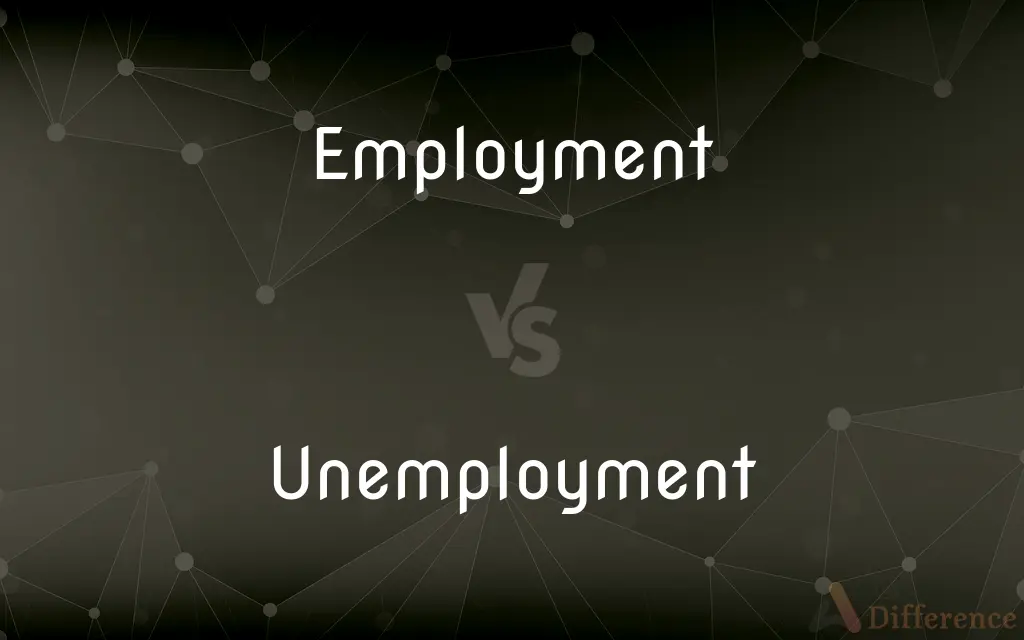Employment vs. Unemployment — What's the Difference?

Difference Between Employment and Unemployment
ADVERTISEMENT
Compare with Definitions
Employment
Employment is a relationship between two parties, usually based on a contract where work is paid for, where one party, which may be a corporation, for profit, not-for-profit organization, co-operative or other entity is the employer and the other is the employee. Employees work in return for payment, which may be in the form of an hourly wage, by piecework or an annual salary, depending on the type of work an employee does or which sector they are working in.
Unemployment
Unemployment, according to the OECD (Organisation for Economic Co-operation and Development), is people above a specified age (usually 15) not being in paid employment or self-employment but currently available for work during the reference period.Unemployment is measured by the unemployment rate, which is the number of people who are unemployed as a percentage of the labour force (the total number of people employed added to those unemployed).Unemployment can have many sources, such as the following: new technologies and inventions the status of the economy, which can be influenced by a recession competition caused by globalization and international trade policies of the government regulation and marketUnemployment and the status of the economy can be influenced by a country through, for example, fiscal policy. Furthermore, the monetary authority of a country, such as the central bank, can influence the availability and cost for money through its monetary policy.
Employment
The act of employing.
Unemployment
The state of being unemployed, especially involuntarily.
Employment
The state of being employed.
ADVERTISEMENT
Unemployment
The percentage or number of people who are involuntarily unemployed
Unemployment has been shrinking throughout the recovery.
Employment
The work in which one is engaged; occupation.
Unemployment
Unemployment insurance.
Employment
An activity to which one devotes time.
Unemployment
The state of having no job; joblessness.
Unemployment made Jack depressed.
Employment
The work or occupation for which one is used, and often paid
Unemployment
The phenomenon of joblessness in an economy.
Unemployment has been considered a cause of crime.
Employment
The act of employing
Unemployment
The level of joblessness in an economy, often measured as a percentage of the workforce.
Unemployment was reported at 5.2% in May, up from 4.9% in April.
Employment
A use, purpose
The personnel director handled the whole employment procedure
Unemployment
(countable) A type of joblessness due to a particular economic mechanism.
All unemployments, seasonal, frictional, cyclical, classical, whatever, mean that you're out of work.
Employment
The state of being employed
Unemployment
(countable) An instance or period of joblessness.
Until then his life had consisted of low-paying jobs, numerous unemployments, and drug use.
Employment
An activity to which one devotes time
Unemployment
Quality or state of being not employed; - used esp. in economics, of the condition of various social classes when temporarily thrown out of employment, as those engaged for short periods, those whose trade is decaying, and those least competent.
Employment
(economics) The number or percentage of people at work
Unemployment
The state of being unemployed or not having a job;
Unemployment is a serious social evil
The rate of unemployment is an indicator of the health of an economy
Employment
The act of employing or using; also, the state of being employed.
Employment
That which engages or occupies; that which consumes time or attention; office or post of business; service; as, agricultural employments; mechanical employments; public employments; in the employment of government.
Cares are employments, and without employThe soul is on a rack.
Employment
The state of being employed or having a job;
They are looking for employment
He was in the employ of the city
Employment
The occupation for which you are paid;
He is looking for employment
A lot of people are out of work
Employment
The act of giving someone a job
Employment
The act of using;
He warned against the use of narcotic drugs
Skilled in the utilization of computers
Share Your Discovery

Previous Comparison
Myology vs. Sarcology
Next Comparison
Headerless vs. Header














































